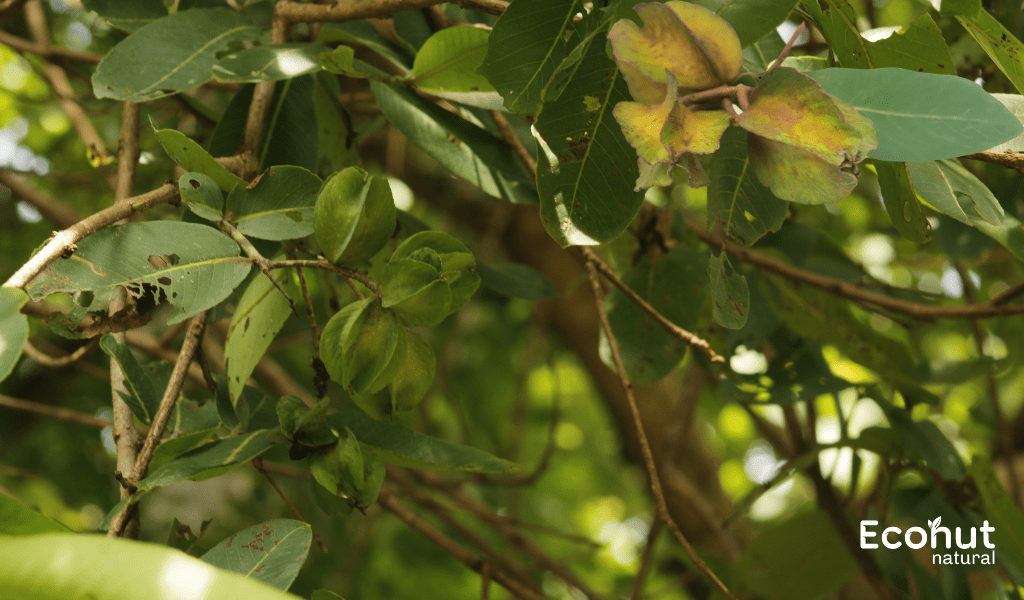Arjuna (Terminalia Arjuna) is the bark of a tree that is used medicinally in Ayurveda to treat cardiovascular conditions that affect the heart specifically. It has a wide range of bioactives, with the water extract potentially helping the heart’s left ventricle function without any obvious toxicity or negative effects when taken three times a day at a dose of 500 mg every eight hours.
Arjuna (Terminalia Arjuna) The trees fruit is a drupe that is 2.5 to 5 centimeters long and fibrous and woody. The Arjun tree ripens its fruit from January to March, and it blooms in May and June.
Arjun (Terminalia Arjuna) is a huge, robust, evergreen deciduous tree with long roots. Many bioactive substances found in arjuna, including cardenolide, tannins, ellagic acid, and gallic acid, have remarkable medicinal qualities.
Description
According to Ayurveda, Arjuna (Terminalia arjuna) is one of the most significant medicines for the heart. This rose-colored tree bark is thought to encourage an inner sense of bravery, resiliency, and love by nourishing and elevating the heart’s emotional and energetic regions. It is also known to tone and strengthen the heart’s physical muscle.
Botanical Name:
Terminalia Arjuna
Family:
Combretaceae
Leaves:
It has conical, oblong leaves that are dark underneath and green above.
Flowers:
White, tiny flowers hang on long, dangling stems.
Root:
Its weak, superficial root system extends radially along the sides of streams.
Habitat:
Arjuna (Terminalia Arjuna) All throughout the Indian Subcontinent, including Uttar Pradesh, Bihar, Maharashtra, Madhya Pradesh, West Bengal, Odisha, and south and central India, as well as Karachi, Pakistan, Sri Lanka, and Bangladesh, arjuna is typically found growing on riverbanks or close to dry riverbeds.
Parts Used:
Bark
Climate and soil:
Alluvial loamy or black cotton soils are preferred by the tree because they are loose, moist, and fertile, have good drainage, and can hold a lot of water. Its native habitat consists of ravines, streams, and soils along river banks. In open, sunny locations with little rainfall, the plant can also thrive.
Dosage:
- Powder – 1- 3 gm, two to three times a day, boiled with water or milk.
- Decoction – 50 – 100 ml
Harvesting:
Since April and May are the dry months, these are the best times to harvest arjun trees. Cut off the thick bark and remove the outer covering of the tree to harvest it for usage. Let the middle and inner layers regenerate. In order to harvest the bark during the following season, make sure to leave it in equal sections.
Chemical Constituents
Triterpenoids, β-sitosterol, flavonoids, and glycosides
Arjuna (Terminalia Arjuna) Care
Sunlight requirements:
The tree will grow best in areas with direct sunlight. To grow this plant, pick a spot in the garden that gets four to six hours of direct sunlight per day. Its growth will be greater the more light it receives.
Fertiliser requirements:
To encourage growth, modify the soil before planting with plenty of organic matter, vermicompost, and cow dung. To encourage growth, apply a balanced liquid fertilizer once every seven to ten weeks.
Soil requirements:
Black cotton or loamy alluvial soils are ideal for Arjun tree growth. Select a growing medium with a high water-holding capacity that is loose, moist, fertile, and well-drained. Streams, ravines, and riverbanks make up its natural habitat. The tree can also thrive in areas that are open, sunny, and have little precipitation. Still, it will grow in regular garden soil.
Other Language Names of Arjuna (Terminalia Arjuna)
English name – Arjun tree
Hindi name – Arjun
Sanskrit name – Dhavala, Nadisarja, Indradru, Shvetavahaa, Veerantaka, Pandava, Phalguna, Kakubha, Virarksha, Partha, Dhoorta, Bhuruha, Veeravruksha
Bengali Name – Arjun Gach
Tamil Name – Poomarudhu, Neelamarudhu.
Telugu Name – Tella Maddi
Kannada Name – Neer matti, Holemaththi, Holedaasaala.
Gujrati Name – Sadado
Malyalam Name – Adamboe, Poomaruthu, Manimaruthu, Chola, Venmaruthu
Marathi Name – Sadaru
Scientific Classification
| Kingdom | Plantae |
| Order | Mrytales |
| Family | Combretaceae |
Ayurvedic Properties
Hindi/Sanskrit
- Rasa -Kashaya
- Guna -Laghu,Ruksha
- Virya -Sheet
- Vipaka -Katu
English
- Taste -Astringent
- Physical Property-Light, Dry
- Potency- Cold
- Metabolic Property (After Digestion)-Pungent
Arjuna (Terminalia Arjuna) Uses
- Arjuna (Terminalia Arjuna) contains blood-cleansing, astringent qualities. Its homeostatic properties lessen pitta aggravation and relieve bleeding conditions.
- Arjuna operates in two srotas, or channels, the reproductive and circulatory channels, as well as in rasa (plasma), rakta (blood), asthi (bone), and shukra (reproductive) in addition to these dhatus, or tissue layers.
- The risk of cardiovascular disease is decreased by arjuna. It encourages healthy heart function by toning and strengthening the heart’s muscles. Apart from its ability to reduce blood pressure, the Arjuna tree also has antihypertensive benefits.
Arjuna (Terminalia Arjuna) Benefits
Respiratory Health:
Arjuna (Terminalia Arjuna) has drying and warming qualities that help help clear the respiratory system of excess Kapha. By doing this, phlegm and mucus can be reduced, improving breathing comfort.
Liver Health:
Liver diseases like liver cirrhosis and hepatitis can benefit from arjuna bark treatment. An extract of arjuna bark helps protect the liver against poisons such as heavy metals, alcohol, and narcotics. In order to guard against oxidative stress, it may also help reduce liver inflammation while boosting antioxidant activity.
Diabetes Management:
arjuna’s ability to control blood sugar levels. Research has shown that this herb has a hypoglycemic effect on major organs and blood serum. The plant’s bark has flavonoids, tannins, and saponins that help break down and absorb glucose, bringing blood sugar levels back to normal.
Emotional wellness:
arjuna has long been utilized to nourish the emotional heart and help people who are grieving or depressed feel more balanced.
Gut Health:
Arjuna helps to preserve and enhance the integrity of the gastric mucosa, which is the lining of the stomach, which is beneficial to the sensitive digestive system. This is significant because it guards against acid assaults, which can cause heartburn.
Keeps heart healthy:
Arjuna is an excellent plant for cardioprotection and heart health. It is useful in reducing cardiac muscle damage from ischemia, building cardiac muscle, and improving blood flow to the coronary arteries. Milk-based Arjuna decoction is the most widely used heart tonic.
Eliminates Inflammation:
Strong anti-inflammatory and antioxidant properties of arjuna shield the body from harmful effects of toxins. One potent plant that can help delay aging is arjuna. It can also enhance overall health and wellness and lessen chronic inflammation.
Heals Injuries:
Because arjuna contains tannins, which help to decrease sores, it is a great ingredient for healing wounds. It expedites the healing of wounds by increasing the turnover of collagen synthesis. Traditionally, the bark is ground into a paste and applied directly to the wound to promote faster healing.
Don’t miss: Dhataki (Woodfordia fruticosa)-Benefits, Properties and Side Effects
Arjuna (Terminalia Arjuna) Side Effects
Anticoagulant Drug:
Arjuna thins blood, which is a problem if you take it with anticoagulant drugs. It would therefore be prudent to see your doctor before using these drugs.
Breastfeeding:
Arjuna is generally not recommended for such women to consume while nursing.
For patients with diabetes:
Because of its blood-thinning properties, arjuna lowers blood sugar levels in the body. Therefore, if you are using any anti-diabetic medications together with Arjuna, you should keep an eye on your blood sugar levels.
Conclusion
Arjuna (Terminalia arjuna) is considered one of the most important heart-related remedies in Ayurveda. This rose-colored tree bark is believed to nourish and elevate the emotional and energetic centers of the heart, so promoting an inner feeling of bravery, resilience, and love.
FAQS
How can Terminalia Arjuna support blood health? What does it mean?
Traditional medicine uses Terminalia Arjuna, also referred to as Arjuna, as a medicinal herb. It strengthens overall heart function, lowers blood pressure, and improves cardiovascular health.
Is Arjuna useful in reducing hypertension?
Arjuna contains qualities that aid with blood pressure regulation. It helps to maintain normal blood pressure by relaxing blood arteries, which enhances blood flow and lessens cardiac strain.
What role does Arjuna play in maintaining a normal heart rhythm?
By controlling the electrical conduction system, Arjuna stabilizes the heart’s rhythm and encourages a steady pulse.
Does arjuna have hepatic benefits?
According to studies, arjuna bark has a hepatoprotective effect that helps shield and enhance the liver’s functionality.

